All posts by aclasuperadmin
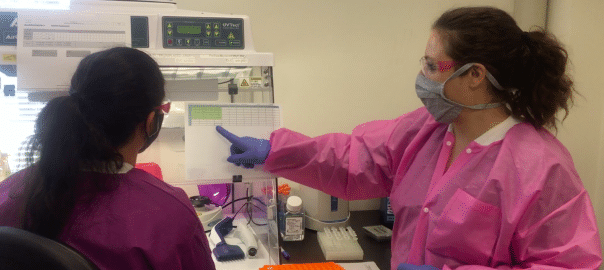
“Every sample is a person, and that’s what keeps us going”: Lab professionals at Biodesix draw upon their own experiences to help patients get the answers they need
Audrey Audetat and Amanda Weaver are two lab professionals leading diagnostic testing at Biodesix, a data-driven diagnostic solutions company that specializes in blood-based diagnostic tests for lung cancer.
Audrey oversees the day-to-day operations of all the commercial testing performed at the clinical laboratory, which she describes as “everything from equipment to training and competency, troubleshooting, reagent acceptance, etc., the whole execution of all of the commercial tests.” In her role, Amanda examines innovations in the research and academic sectors, and works to integrate those tools to run diagnostic tests.
Aside from working in the same lab, Audrey and Amanda share another thing in common – their work at Biodesix is personal. “Two of my aunts have passed away from cancer, and my other aunt was just diagnosed with stage 4 bone cancer, so it definitely runs in my family, so I have a huge passion for cancer research and cancer biology,” explains Amanda.
For Audrey, her own grandfather quickly passed away from lung cancer 35 years ago, at a time where information and options for testing were extremely limited. These firsthand experiences from Audrey and Amanda remind them every day about the importance of a timely and accurate diagnosis for cancer patients.
“One of the things we pride ourselves on as a company is our turnaround time. And time matters. Not just to treatment but for the patient’s peace of mind, and so we want those patients to have their answer as fast as possible,” emphasizes Audrey.
Audrey highlighted Biodesix’s impressive turnaround time for their lung cancer testing – “we promise 72 hours and they’re well under that.” Getting patients their results as fast as possible can help them get the right treatment as fast as possible – which for conditions like lung cancer, is critical.
“Lung cancer is really a devastating diagnosis, because it is such a short life expectancy once you are diagnosed, but the more there are targeted treatments and you can help people get on those by giving them results, that’s a really good feeling,” reiterates Amanda.
Both Amanda and Audrey applauded the efforts of their team members, who share their professional and personal passion for the work they do to help patients. “I want people to know that there’s a team of people that they don’t even see that are working for them,” says Audrey.
Watch the video below to learn more about how Audrey and Amanda, and their team at Biodesix, are working behind the scenes to provide answers for patients.
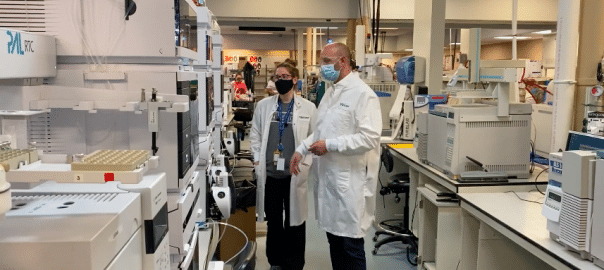
Driving better outcomes, one patient at a time
For Dr. Matthew Hardison, every day is an opportunity to leverage the power of science and technology to deliver results for patients. “People get into this kind of work because they know it is directly impactful to patient care,” he says.
As Senior Vice President of Lab Operations at Aegis Sciences Corporation, he leads efforts in the toxicology space of pain management – tying together behavioral health, addiction medicine, primary care, as well as orthopedics.
“If you think of an X-ray as the very basic lifting of the hood on the car, clinical lab testing is where you hook it up to the diagnostic machine and identify the root of the problem,” he says. “We exist to provide objective, hard data on what is going on in the patient’s system.”
With non-prescription substance use and medication diversion on the rise, Dr. Hardison’s work has never been more important. Like many laboratories, the challenges of the COVID-19 pandemic prompted Aegis to look beyond traditional testing approaches. “With the ongoing opioid epidemic, we were quickly able to launch new types of testing that enabled physicians to move to a more telemedicine-style approach but still maintain that level of patient care,” says Dr. Hardison.
Beyond the standard opioid testing that most people picture when they think of toxicology, Dr. Hardison and his colleagues also help providers understand of the impact that opioids and benzodiazepines can have upon a patient, including how the detection of these substances can be masked or impacted by other medications and consequently impact patient response.
Objective data gleaned from clinical laboratory tests, such as a patient’s insulin level, amount of morphine in their system, or a gene mutation, can help clinicians provide more personalized care and drive better outcomes for patients and their families.
Watch the video below for highlights from the interview with Dr. Hardison and learn more about the critical work performed by laboratory professionals across the country to empower better clinical decision-making and drive better care for patients.
Diseases are smart, so labs stay smarter: chasing evolving diseases in the lab
From a young age, Shrei Crenshaw was destined for a career in health care. She was passionate about helping others, but saw herself being more behind the scenes.
Fast forward to today, Shrei is the Lab Operations Manager at Inform Diagnostics, where she oversees multiple technical teams across the company, totaling about 120 technical staff. Alongside her team, Shrei works to provide clear, actionable answers so that providers can determine the best treatment plan for patients. “I like to refer to us as the wizards behind the curtain. We are the ones that are providing their clinicians with a diagnosis so the clinicians know how to treat them appropriately,” says Shrei.
Despite the onset of the COVID-19 pandemic last March, Inform Diagnostics continued to receive specimens daily from providers who stayed open to provide cancer screenings and treatment. “COVID did not stop cancer,” emphasizes Shrei. “We were able to still provide them with the same level of work and the same level of quality that we were providing them before the pandemic. And that was very important to us to make sure that we were staying open and still serving our clients and our patients as best we could.”
Since starting her career, Shrei has witnessed firsthand the evolution and innovation of the industry to provide the best services for patients. For instance, many testing facilities now have state-of-the-art tracking systems that are comparable to that of logistics couriers like FedEx and UPS. Having these technological tools in place can help alleviate some anxiety for clients in having the awareness of where a specimen is in the process of testing.
Shrei and her team are constantly working to stay ahead of the curve and deliver the testing that patients and providers need. “These diseases that we treat daily are getting smarter and smarter every day, and we have to continue to be smarter and smarter along with them,” Shrei says. “As we saw with COVID-19, diseases mutate at a rapid pace, and that’s why research remains a huge aspect in what we do.”
Watch the highlights below from the interview with Shrei to learn more about her work at Inform Diagnostics.

“Striving to find that answer”: At BioReference and GeneDx, lab professionals put their hearts into all that they do
Delivering answers for patients isn’t just a job, it’s a calling. For Katie Aoyama, the Assistant Director of the Technology, Transfer and Validation Department at GeneDx, a subsidiary of BioReference Laboratories, Inc. and OPKO Health Company, each day offers an opportunity to rethink what it means to put patients first and continuously innovate.
“If a doctor thinks a patient may have a specific disorder or general developmental delay and they don’t know what’s going on, that’s when we get the sample and investigate,” says Katie. “Every sample is a patient, every sample is someone’s child—we’re striving to find that answer.”
This unwavering commitment to patients motivates the lab professionals who are working behind the scenes, performing highly accurate and reliable testing.
Katie believes this career path chose her – not the other way around. Striving to pursue a science-focused career, she first joined GeneDx as an entry-level technician in the copy number department. From there, Katie steadily worked her way up to supervisor, growing along with the company.
“At the point that I started, we were doing about sixteen samples a day, and now it’s hundreds and hundreds of samples, so I got to grow with the company—do high-throughput processing, build in automation,” says Katie. “It was a perfect situation where I got to learn all the skills for the department that I’m now leading.”
The key to keeping things running smoothy in the lab? Teamwork. Collaboration is essential, and allows for improvements and innovation year-round. Through this one-team mindset, Katie and her colleagues are able to achieve new accomplishments in their pursuit for answers.
“I work really closely with the R&D department and upper management to think about what’s new, what’s coming, how can we improve things for the patient, how can we make it cheaper and faster – so we’re always looking forward and planning for what we can do to make it better,” says Katie.
The past year was undoubtedly a challenging one for lab professionals, yet Katie and her team were able to continue to go above and beyond for the patients that rely on them.
Watch the video below to learn more about the critical contributions that lab professionals like Katie provide each and every day.
ACLA Comment Letter on 2021 NCCI Policy Manual
ACLA Comments on MCIT/Reasonable and Necessary Definition Proposed Rule
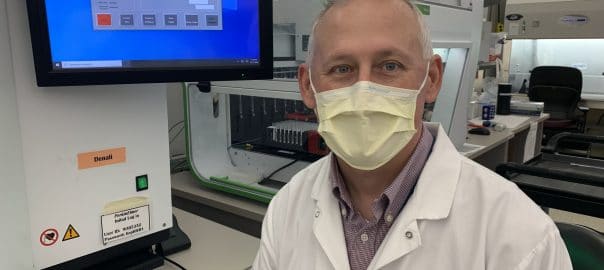
Rapid Change is the Name of the Game
This Laboratory Professionals Week, we honor the innovators, collaborators and colleagues who have gone above and beyond behind the scenes to meet patient need. Today, ACLA is celebrating Dave Majewski, a supervisor at Mayo Clinic Laboratories in Rochester, Minnesota, whose job dramatically changed over the last year as he went from overseeing 40 staff members to more than 240 in a 24/7 lab.
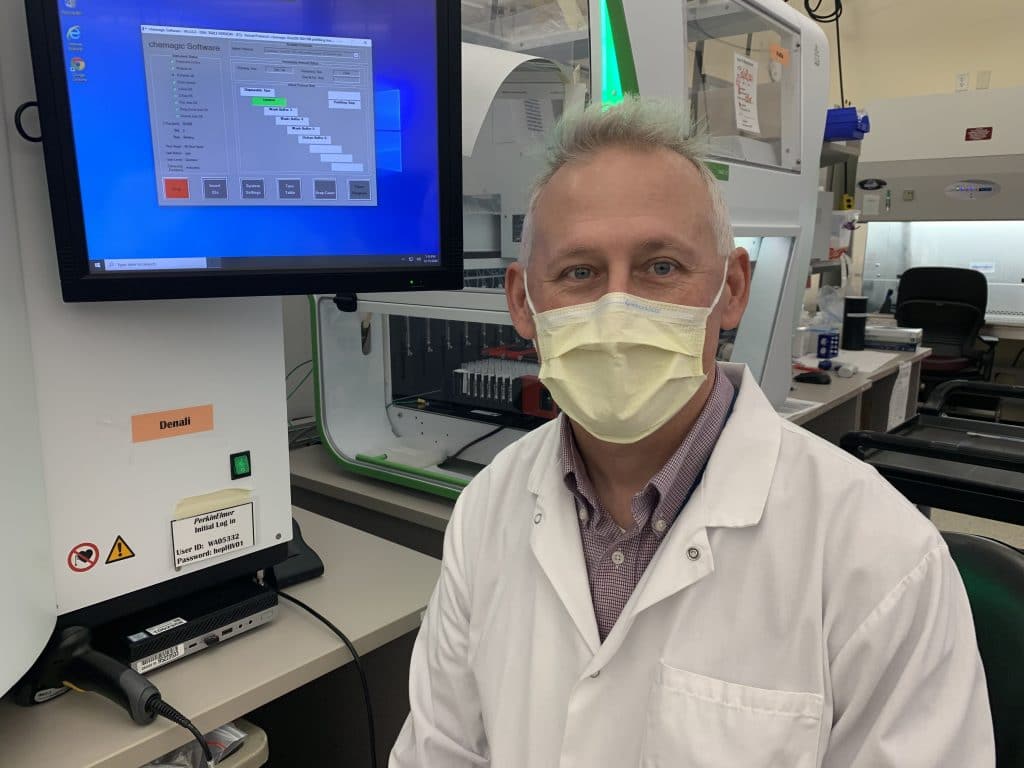
For more than 15 years, Dave Majewski has led his colleagues at Mayo Clinic Laboratories’ Department of Laboratory Medicine and Pathology to meet patients’ critical health care needs. 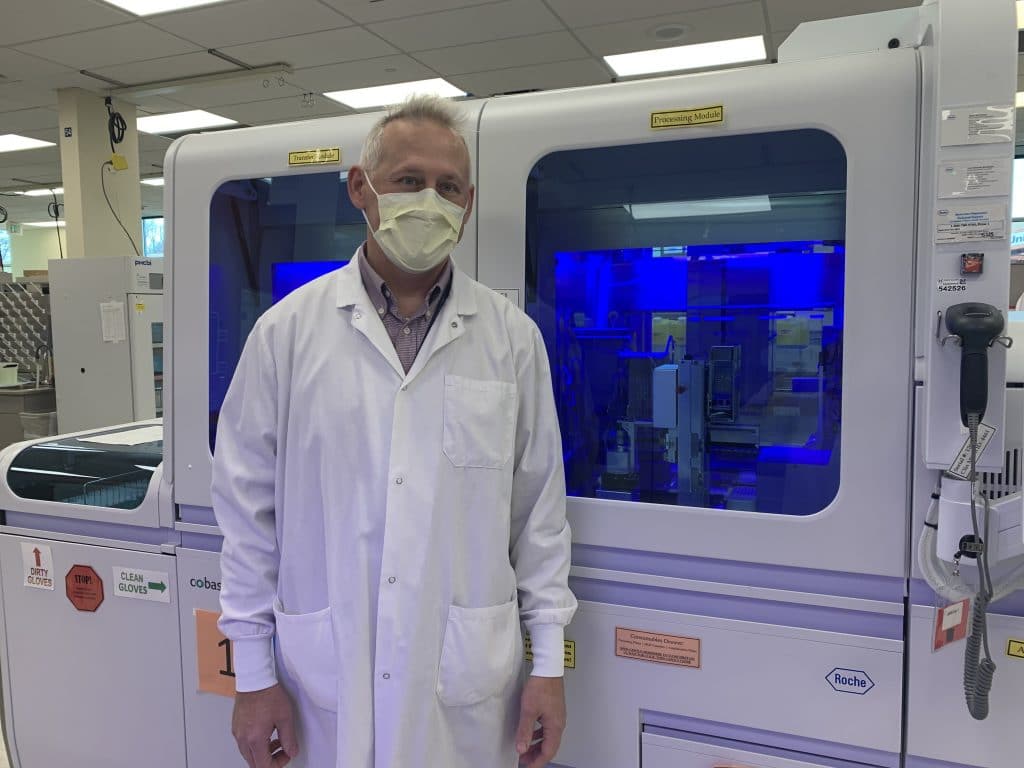
Prior to the COVID-19 pandemic, Dave supervised 42 staff members within the HIV/Hepatitis Laboratory, which was divided into two work units: the molecular lab and the serology lab.
In the early days of the pandemic, Dave Majewski faced the challenge of a lifetime: developing and validating a new COVID-19 PCR test in a matter of days.
It began with a routine call with a vendor about a potential COVID-19 test they might have available. The next morning, Dave was tasked with bringing a COVID-19 test online within three to four weeks — a process that typically takes six to nine months. At the end of the day, that timeline shifted to two weeks and by the next morning, Dave and his colleagues were given only few days to develop and validate a COVID-19 test.
“Within 119 hours, our team was able to adjust staffing, add equipment, validate the test, train staff and go live,” says Dave on the rapid change in his lab.
Adapting to address the needs of patients during the COVID-19 pandemic meant that Dave had to make adjustments among his staff and it needed to be done quickly. In the HIV/Hepatitis Molecular Lab work unit, the number of lab professionals increased exponentially, growing from 21 to roughly 240 individuals. In addition to welcoming and training a more than elevenfold increase in new colleagues to meet the demands of COVID-19, Dave noted the around-the-clock effort that completely transformed the molecular lab division. “We went from two shifts Monday through Friday, with one Saturday shift, to 24/7 testing,” explains Dave.
Dave attributes teamwork as his personal source of inspiration and calls it a key success factor in Mayo Clinic Laboratories’ efforts to innovate and introduce a highly accurate and reliable COVID-19 test. “Facilities did a remarkable job to rearrange with short notice on multiple occasions,” describes Dave. “All the supervisors around us offered to help, knowing we’re completely swamped. If we needed something, someone was there to provide assistance.”
In the year since ACLA member laboratories led the way to validate and launch the first novel tests for SARS-CoV-2 virus, lab professionals like Dave have worked around the clock to collectively perform more than 118 million PCR tests for COVID-19 as of April 18, all while adapting platforms and workflows, navigating supply constraints and working creatively and collaboratively to meet patients’ evolving health needs. As new strains of the virus emerge and more Americans get vaccinated, Dave’s work remain critical to ensure robust access to accurate and reliable COVID-19 testing. ACLA member laboratories remain focused on those efforts, and increasing and maintaining access to all kinds of clinical lab tests – including the latest innovative diagnostic tools to drive forth the next generation of patient care.